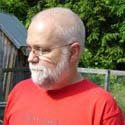Are two-part structures themselves suspect, whether binary or causal?
Logics: I think we can agree that different language games have different grammars. Use of the word logic seems . . . too determinative. One of the underlying structures of human thought--perhaps the underlying structure--is grammar(s). Logic comes along later, I think. William Barrett, in The Illusion of Technique, spends a good deal of time early in his text exploring the ways in which W's conception of logic came out of & diverged from Russell's & Whitehead's. Wittgenstein in the Tractatus, writes Barrett, takes the idea of logic to its , , , logical conclusion: "Any one thing can either be the case, or not be the case, and everything else remains the same." This is a logic in which the statement "If twice two is four, then snow is white" is a perfectly formed proposition. Barrett notes, of this proposition, that it "jars our habits of ordinary speech," but adds that "it is precisely this kind of device that provides mathematical logic with its unique powers of manipulation and calculation." [TIOT 43] I remarked a couple of weeks ago to my Imagining Science class that scientific reductionism has proved to be boat a powerful intellectual tool & a deceptive intellectual trap leading to a callow kind of confidence in one's own powers of understanding. Reductionism is an instance of mathematical logic, no? Let's say the Greeks invented logic & that Russell & Whitehead completed the project. Did no one think before the Greeks? Did no one think rigorously before the Principia? Hardly. Human thought, emerging from & blending back into animal thought, surely precedes logic. Which must mean that logic is based on . . . what? Animal thought & human grammars? [Note: I need to go back & look at Santyana's "Skepticism and Animal Faith" again.]
Philosophical Investigations
Christopher Robinson & Joseph Duemer read Wittgenstein's Philosophical Investigations


0 Comments:
Post a Comment
<< Home